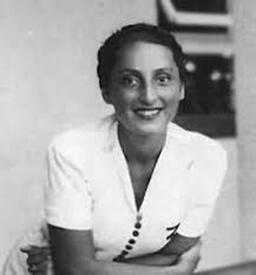 On Friday 8th March 2019 "Non Omnis Moriar" for Upper Voices was broadcast on BBC Radio 3 as part of the Afternoon Concert program for International Women's Day. You can listen at 1:26 here. The piece was recorded by the BBC Singers as part of a wonderful concert in association with BASCA reflecting on the Refugee experience in September last year. There is more information about the poet and the music at the end of this blog but I would like to let the poem speak for itself. it is quite simply one of the most powerful poems I have ever read and I can only hope my music does it justice. If you would like to listen the broadcast can be found here NON OMNIS MORIAR (Not all of me will die.) Text from the poem by Zuzanna Ginczanka (1917-1945) Not all of me will die – not my proud estate, Meadow tablecloths, wardrobe castles strong, acres of fine bedsheets, linen treasures great, And dresses, light dresses – these are my swansong. Because I leave not a single heir. Let your curious hands through my Jew things browse, if conscience allows. Meadow tablecloths, wardrobe castles strong, acres of fine bedsheets, linen treasures great, And dresses, light dresses, if conscience allows. You and your loved ones, recall my name and face, As you remembered me when showing them my hiding place. Drink to me! Drink to me! Drink to my grave and supposed wealth, my remains your prize. Drink all night, drink! And when the sun does shine, Start hunting for gem-stones, digging for gold, Through mattresses, fine drapes, candlesticks and dresses, light dresses. Feathers ripped from cushions, clouds of gutted quilts, Will snow upon your hands, turn your arms to wings, Pure white down will bind with my blood congealed, Letting you take flight, My angels, my kings. Non omnis moriar. The text used is based on a translation by Marek Kazmierski with permission
Zuzanna Ginczanka’s Jewish parents fled the Russian Civil War, settling in 1922 in pre-War Poland. Although, as a poet, she published only a single collection of poetry in her lifetime, the book O centaurach ("About the Centaurs"), it created a sensation. Ginczanka left Warsaw in June 1939 to spend her summer vacations with her grandmother. Following the outbreak of the Second World War her grandmother’s business was immediately expropriated and their living quarters requisitioned for Soviet officials. This forced Ginczanka to move to the larger and more anonymous Polish city of Lvov. Before they left, her grandmother packed all the family heirlooms and valuables like table silver into her luggage, both as a means of keeping it safe and to provide for Ginczanka's future dowry. Once she arrived in Lvov Ginczanka narrowly managed to avoid arrest by Ukrainian forces targeting Jewish population. Nazi Germany invaded Poland on 22 June 1941. The female concierge in the building where Ginczanka rented a flat saw her opportunity to rid herself of the unwelcome tenant and at the same time enrich herself. In the summer of 1942 she denounced Ginczanka to the Nazi authorities as a Jew hiding in her building on false papers. The Nazi police immediately attempted to arrest Ginczanka, but other residents of the building helped her escape. They finally succeeded in capturing her but this arrest did not result in Ginczanka's execution as on this occasion she escaped from captivity. The incident led Ginczanka to write her best known poem "Non omnis moriar". Zuzanna Ginczanka frequently changed hiding places, but was eventually detained in the notorious Nazi prison, Montelupich but she never admitted to being Jewish. There is no certainty as to the exact place of Ginczanka's death but there is a broad consensus on her having been executed by firearm, either by single firearm or by firing squad. Ginczanka was 27 years old. Musically the piece is based on elements of Jewish prayer modes that give rise to the dark cluster chords supporting the solo soprano lines. The poem contains lists of items that make up Ginczanka’s “proud estate”, her “Jew things”, reminding us of her grandmother packing the valuables before their flight to Lviv. These are set aleatorically, with every individual voice listing them with rising hysteria at different points throughout the piece. The phrase “Non omnis moriar” is also repeated at various points, binding the piece together and reminding the listener that they are listening to the words of a young woman writing what would become her lasting message to the world. In a bitter footnote, Zuzanna Ginczanka's betrayers were arrested and tried for collaborationism. "Non omnis moriar" formed part of the evidence against them. (This is considered by many scholars to be the only instance in the annals of history of a poem being entered in evidence in a criminal trial.)
3 Comments
Marek
8/3/2019 06:28:07 pm
Two minor comments:
Reply
Leave a Reply. |
Details
AuthorAlison Willis is a composer and musician based in the East of England. Archives
May 2024
Categories |
 RSS Feed
RSS Feed